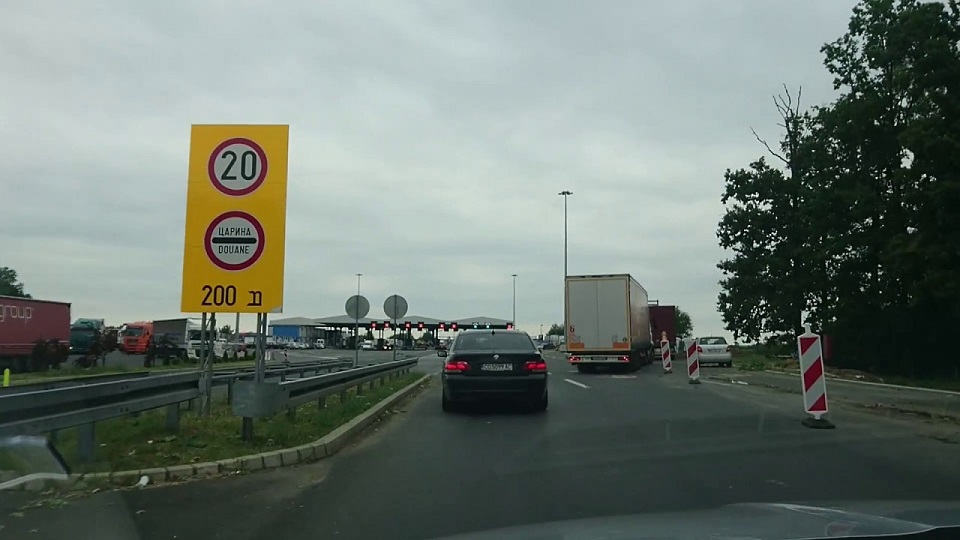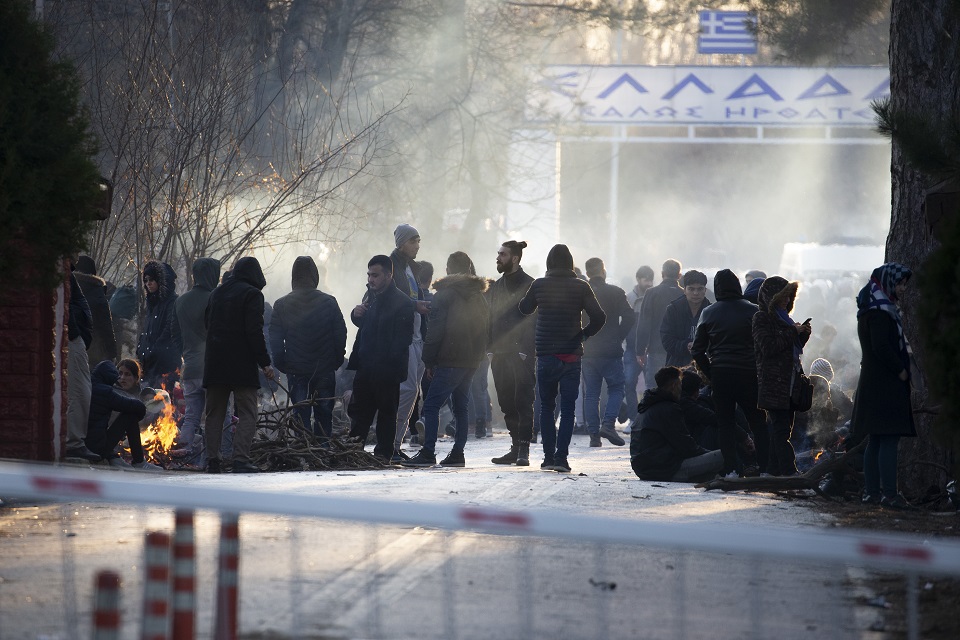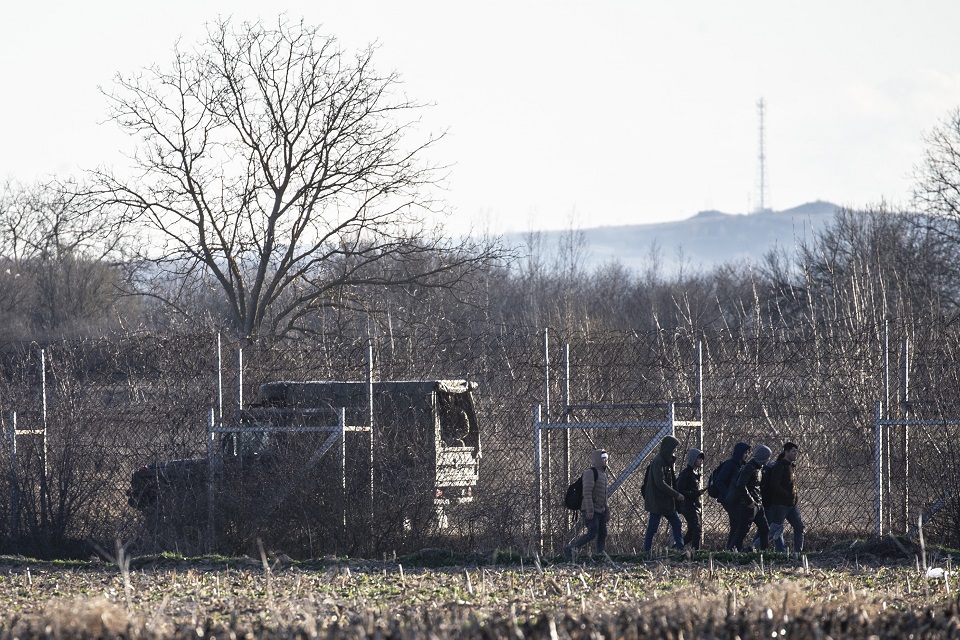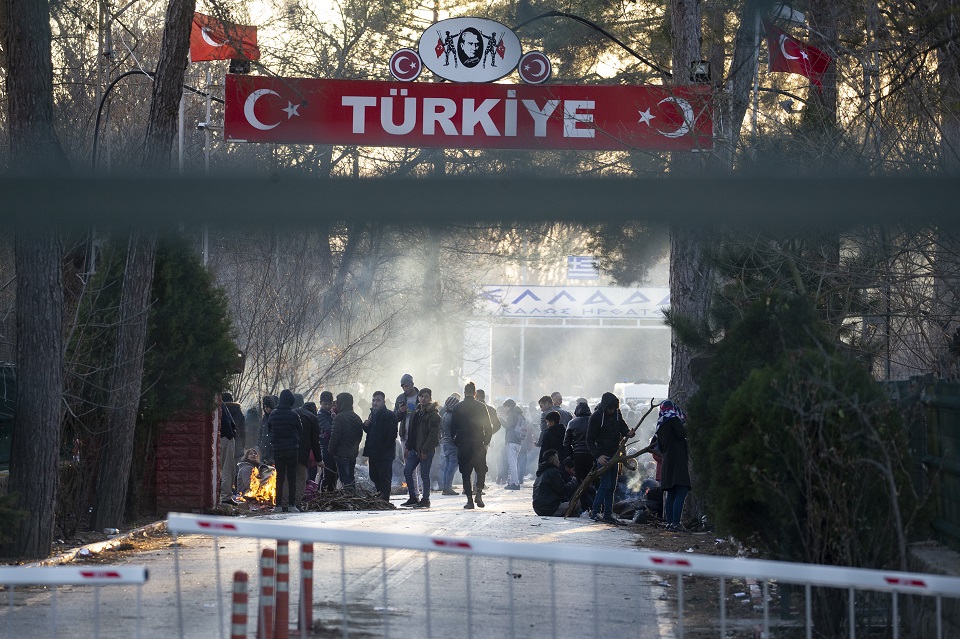Croatian Police Participating in Frontex Operations at Sea in Greece
ZAGREB, April 10, 2020 - Croatian maritime police are participating in two joint operations of the European border and coast guard agency Frontex at sea in Greece, the Ministry of the Interior said on Thursday.
After in early March this year the first contingent of four police officers was sent to Greece as part of Frontex's joint operation "Rapid Border Intervention 2020", on April 8 a second police contingent was sent to replace the first one and it will stay in Greece until the completion of the operation on May 6.
The first contingent performed all of their duties responsibly and professionally, for which they received written commendations from the FRONTEX director, the ministry said.
The mission on the Greek-Turkish border currently numbers 100 police officers from EU member-countries.
Depending on the circumstances, the duration of the operation may be extended and the police contingent participating in it may be expanded, the ministry said.
In addition to this operation, since 2015 the Ministry of the Interior has been continually providing strong support to Greece through the participation of its maritime police in the joint operation Poseidon, aimed at enhancing the control of the Greek-Turkish border at sea.
Croatian maritime police also help in operations to search for and rescue migrants and refugees at sea.
Croatian police have been helping Greece control its maritime border with two boats.
More news about migrant crisis can be found in the Politics section.
Asylum Seekers in Croatia Not Infected with Coronavirus
ZAGREB, March 19, 2020 - Asylum seekers in Croatia are not infected with the coronavirus, the Croatian Interior Ministry said in a press release on Wednesday evening, adding that all asylum seekers at the reception centres in Zagreb and Kutina were under constant medical observation.
"They did not arrive now at the time of tightened border controls from the high-risk countries. They have been warned about the outbreak of the disease and measures that need to be taken to prevent its further spreading," the ministry said.
Flyers have been displayed in the reception centres containing instructions from the Croatian Public Health Institute about the importance of prevention and self-isolation.
Access to the reception centres has been temporarily restricted for all persons whose presence is not absolutely necessary for the functioning of the facilities, the ministry said.
More news about the migrant crisis can be found in the Politics section.
Croatia Trucking Companies Slapped with Fines for Migrant Stowaways
March 11, 2020 - In addition to foreign and domestic truck carriers having problems at border crossings due to the coronavirus, they are also taking a financial hit from the migrant situation, not at the Italian border, but at the Serbian border with Croatia.
Migrants Jumping into Trucks from Overpasses
“Transportation and road transport and are the blood vessels of the economy and they must function. Truck carriers were instructed to tell their drivers how to behave regarding the coronavirus, but as far as migrants were concerned, they were not. They can’t do anything about it because migrants are jumping onto trucks from overpasses at night, cutting the tarpaulins, then settling in and waiting for the trucks to cross the border. The material damage and financial burden to carriers is immeasurable. And even when migrants are found in their trucks, the carrier is found guilty,” said Marijan Banelli, a traffic lobbyist, at Studio 4 on HRT (Croatian Radio Television).
A 28,000 HRK (3696 EUR) fine was slapped on the carrier Mario Ćurak, for example. Three migrants were found in his truck, and after Ćurak complained to customs in Osijek, the sentence was increased to 39,000 HRK (5148 EUR) and he was "neither guilty nor indebted" according to Novac/Jutarnji List on March 11, 2020.
“I have 12 trucks and every morning I expect another driver to call me and say that they have found migrants in his truck. We don’t have anything to do with this. Anything outside the cabin should not be our responsibility,” complained Ćurak.
His colleague Zeljko Marić has found migrants in his truck three times, and the last time was about three weeks ago.

Batrovci | YouTube
Croatia Fine for Carriers Found with Illegal Migrants: Up to 3036 EUR
If the driver is a foreign citizen who holds a work permit, customs confiscates the truck and the goods and the driver cannot continue until the fine is paid, which is on average 22,000 to 23,000 HRK (2904 to 3036 EUR). And we cannot delay payment for seven days, for example,” claims Marić.
“I think that the Croatian government must come forward and take responsibilty to protect the Croatian people, our carriers and drivers, because this behaviour is just protecting migrants. They must be treated as illegals who are crossing the border. The coronavirus is a force of nature, but migrants are not. The problem of Bajakovo (Croatian border town) and Batrovci (Serbian border town) must be resolved at the bilateral level, but Brussels must also be included because this is essentially a true Schengen border,” Banelli concluded.
Follow this page and our Politics page for Total Croatia News updates on the migrant crisis in Croatia.
Croatian Police to Help Guard Greek-Turkish Land Border
ZAGREB, March 11, 2020 - Croatian police will be deployed at the Greek-Turkish border as of Wednesday as part of an operation conducted by the European Border and Coast Guard Agency, known as Frontex, the Ministry of the Interior said in a statement on Tuesday.
Four Croatian police officers were sent to Greece on Tuesday to help guard the Greek-Turkish land border as part of Frontex's Rapid Border Intervention 2020 mission.
The operation is being launched on Greece's request and in accordance with the European Border and Coast Guard regulation. It starts on 11 March and ends on 6 May this year, and will involve a total of 100 police officers from EU member states.
The Croatian police will stay in Greece until 8 April when they will be replaced by another contingent who will stay in the country until the end of the operation in May. There is a possibility of the operation being extended and the contingent enlarged, the statement said.
Greece is facing an influx of migrants from Turkey after Ankara announced on 29 February that it was opening its borders towards the European Union. Turkey has taken in nearly four million people displaced by the Syrian war.
More news about the migrant crisis can be found in the Politics section.
Bosnia Border Police Stops 1,600 Illegal Migrants Since Start of Year
ZAGREB, March 10, 2020 - Since the beginning of the year Bosnia and Herzegovina's border police have prevented more than 1,600 migrants from illegally entering the country from Serbia and Montenegro, the Dnevni Avaz daily reported on Tuesday.
By 8 March there were a total of 1,656 attempts of illegal entry recorded.
According to information from the county's border police, more than 1,300 people attempted to cross the border in the area of Zvornik in eastern Bosnia.
Most of the irregular migrants come for Pakistan, Afghanistan and Iran.
The border police have assessed that this is somewhat less pressure by migrants considering the winter period and colder weather however the authorities believe that that situation will change with the spring weather when the number of migrants attempting to cross the border and travel on to Western countries, could increase.
In 2019, the border police prevented a little more than 13,000 attempts of illegal entry into Bosnia and Herzegovina.
More news about the migrant crisis can be found in the Politics section.
Minister Says Croatia Prepared to Take in Unaccompanied Children Migrants
ZAGREB, March 9, 2020 - Croatia is prepared to adapt to the crisis situation and accept unaccompanied children migrants who are identified to be without their parents on its territory, Demography and Social Policy Minister Vesna Bedeković said on Monday.
"The social welfare system in Croatia has a developed service to accept unaccompanied children who are found on Croatian territory. Croatia is prepared to adapt to the crisis situation and challenges and accept unaccompanied children who are found in the country without their parents," Bedeković told reporters.
She believes that this is primarily a humanitarian issue as it concerns children as the most vulnerable group.
The Demography and Social Policy Ministry cooperates with the Interior Ministry with regard to unaccompanied children found on Croatia's territory, who are taken to a social welfare centre and placed in an appropriate institution. After that, an individual plan is made according to the assessed needs of the child to provide it with the most adequate care.
There have been about 50 cases to date and these were mostly children in transit, Bedeković said, underscoring that Croatia has the professionals to handle these situations but that currently there is a shortage of interpreters.
She said that Croatia has had a protocol since 2018 regarding the treatment of unaccompanied children and that it currently has two reception centres with adequate capacity, in Zagreb and Split.
"We have the necessary personnel, and everything else that will be needed will be secured. In that regard, we also expect funding from the EU," she said.
The most important thing is to ensure fast and better interdepartmental cooperation so that Croatia can adapt to any possible quotas it will be assigned, the minister said, adding that she did not have information yet on the number of children Croatia would possibly accept.
"I stress that this is not about foster care or adoption but about provision of accommodation for children in crisis situations. This is primarily a humanitarian issue, a response to a crisis situation, and provision of accommodation to children without parental care," said Bedeković.
More news about the migrant crisis can be found in the Politics section.
Croatia and Bosnia Improve Cooperation in Migration Control
ZAGREB, March 9, 2020 - Croatian and Bosnian police cooperate well in controlling illegal migration, and the two countries should also address their outstanding issues through dialogue, Croatia's Ambassador to Bosnia and Herzegovina, Ivan Sabolić, said in an interview with the Sarajevo newspaper Dnevni Avaz of Monday.
Sabolić said that a recent meeting between Croatian Interior Minister Davor Božinović and his Bosnian counterpart Fahrudin Radončić was an example of good cooperation that had already produced results and improved communication, especially in fighting illegal migration. He noted that the recent Croatian government decision to donate police equipment to Bosnia and Herzegovina to help it improve border control and curb cross-border crime had also contributed to that.
Asked if Bosnia and Herzegovina could benefit from the Croatian presidency of the EU, Sabolić said that Croatia strongly supported Bosnia and Herzegovina's EU path based on meeting the set criteria, and noted that no other EU member state had helped Bosnia and Herzegovina with the membership application as Croatia.
"Croatia is the staunchest advocate and friend of Bosnia and Herzegovina's EU path, which will help incorporate European values into its legal system while at the same time respecting its particularities. The Croatian presidency unquestionably supports Bosnia and Herzegovina's progress towards membership candidate status," the ambassador said.
He said that the EU-Western Balkans summit in Zagreb in May would be a chance to reinvigorate the accession processes of neighbouring countries and give fresh impetus to the dynamic of their getting closer to the EU in the years ahead.
Sabolić said that outstanding issues such as one concerning the possible construction of a radioactive waste storage facility on Mount Trgovska Gora near the Croatian-Bosnian border should be addressed through dialogue but that there had been no such initiative from Bosnia and Herzegovina so far.
"If and when the institutions of Bosnia and Herzegovina formally express the wish or need to discuss this matter, the Croatian minister in charge is ready for dialogue to address all aspects of the interest or doubts on Bosnia and Herzegovina's part," the Croatian ambassador said.
Sabolić said that the unresolved issues between the two countries were not insurmountable and could be resolved through dialogue.
He expressed serious concern about the equality of Bosnia and Herzegovina's three constituent ethnic groups, saying that it was undermined in practice to the detriment of the Croats and warned that it was necessary to prevent the possibility of one ethnic group electing representatives of another.
"Croatia supports a democratic agreement on a fair electoral law that will guarantee the adoption of European standards, prevent abuse and ensure equal status for the three constituent peoples and all citizens of Bosnia and Herzegovina," Sabolić said, adding that amending the electoral law would be a key step towards stability and progress, strengthening mutual trust and respect for the rights and freedoms of all citizens of Bosnia and Herzegovina.
More news about relations between Croatia and Bosnia and Herzegovina can be found in the Politics section.
Croatia Willing to Help Refugee Children on Greek Islands
ZAGREB, March 8, 2020 - Croatia is ready to take in some of the child refugees trapped in inhumane conditions in refugee camps on Greek islands, Croatian Prime Minister Andrej Plenković said on Sunday.
A great number of young refugees, who are not accompanied by parents or by some older relatives, are stuck in makeshift camps for refugees and migrants.
Plenković, who was visiting the town of Sinj today, confirmed that Croatia was ready to accept some of those unaccompanied minors who are staying in difficult conditions on those islands.
The transfer of child refugees and migrants from those islands to other EU member states will be on the EU agenda after the European Commissioner for Home Affairs, Ylva Johansson, visits the Greek islands swarmed with migrants next week.
"Croatia has always shown a totally humanitarian approach. We used to be a country with dislocated people and refugees, notably those from Bosnia and Herzegovina. Children need additional protection," said Plenković.
Interior Minister Davor Božinović said at a news conference on Sunday afternoon that Croatia had experience in providing care for child refugees and unaccompanied minors.
Commissioner Johansson is tasked with checking the status of each unaccompanied minor who is likely to be transferred from Greek islands to EU member states. This measure has been ordered so as to prevent the abuse the status of "unaccompanied minors" by families that suddenly appear and seek asylum in the country that has received the child concerned, the Zagreb-based Večernji List daily wrote on Sunday.
More news about the migrant crisis can be found in the Politics section.
Plenković in Phone Conversation with Erdogan: EU Backs Ceasefire in Syria
ZAGREB, March 7, 2020 - The European Union supports the agreement on ceasefire in Syria and on the de-escalation of the situation with migrants on the Greek-Turkish border, Prime Minister Andrej Plenković says on his Twitter account after he contacted top EU officials and the Turkish President on the phone on Friday.
After the telephone conversations with European Commission President Ursula von der Leyen, European Council President Charles Michel as well as President Recep Tayyip Erdogan, the prime minister of Croatia, the current holder of the EU presidency, tweeted that "we support the agreed ceasefire in Syria and de-escalation of the situation with migrants along the Greek-Turkish border."
Thousands of migrants and refugees are trying to enter the EU after Turkey's claim that its border with Europe is open.
The latest developments prompted the EU Foreign Affairs Council, which was convened in Zagreb on Friday, to adopt a statement on the crisis in Idlib and the situation at the EU external borders.
The statement reads that the Council "acknowledges the increased migratory burden and risks Turkey is facing on its territory and the substantial efforts it has made in hosting 3,7 million migrants and refugees."
"The Council also strongly rejects Turkey's use of migratory pressure for political purposes and restates that the EU and its member states remain determined to effectively protect EU’s external borders, in accordance with EU and international law.
"In this context the Council reiterates the EU's full solidarity with Greece, which faces an unprecedented situation, as well as with Bulgaria, Cyprus and other member states in their efforts to manage the EU's external borders," reads the statement.
Acknowledging Turkey's efforts to stop a migrant wave in 2015, the Croatian Presidency of the Council of the EU calls on Ankara to honour the 2016 agreement.
Addressing the Council in Zagreb earlier on Friday, PM Plenković said the migrants who had arrived at the Greek border in the past few days should return to Turkey.
We think that's the most appropriate option. They are not people who came because of the current situation in Idlib but people who have been in Turkey for several years, he added.
"On Idlib, the Council notes that the recent and continuing offensive by the Syrian regime and its backers, including Russia, is creating untold human suffering and has provoked the worst humanitarian crisis since the beginning of the Syrian conflict," the EU Council says in its statement.
"The Council therefore calls for an urgent de-escalation of the conflict in Syria in order to avert a slide into international military confrontation, and prevent further suffering.
"The Council notes the outcome of the Russia-Turkey meeting yesterday in Moscow and reiterates, in the strongest possible terms, its call on all parties to keep in place an immediate and a sustainable ceasefire, to guarantee the protection of civilians on the ground and from the air and to enable the unhindered delivery of humanitarian assistance by the international community," reads the Zagreb statement.
More news about relations between Croatia and Turkey can be found in the Politics section.
Turkey Advises Migrants on Routes to France, Germany: Avoid Croatia
March 6, 2020 - Turkey has released a map of route options for migrants hoping to reach France and Germany, and Croatia has been bypassed. Greek media outlets recently reported Turkey's geographical map with "routes" running from Turkey into Western Europe.
They claim that it is further evidence that Ankara has officially participated in the developing crisis by encouraging migrants and refugees to enter the EU illegally. The map, along with instructions in Arabic, was published by the official Turkish state television TRT Arabic and posted on their Twitter page and Facebook page on February 28, 2020.

Turkey Migrant Map Shows Five Routes to France, Germany
According to the map, migrants and refugees are directed to five route options through Turkey to five "entry points" to Greece: four on its islands, and one via the land border, across the Evros river, where the Greek army was recently deployed, and where conflicts across the border line are now almost continuous.
Upon arrival in Greece, migrants and refugees would, according to the map, cross through Italy on their way to France, which is shown as a major destination.

TRT Arabic Map Bypasses All Former Yugoslav Countries
The other route from Turkey heads Northwest, bypassing all the countries of the former Yugoslavia, then passes through Bulgaria, Romania, Hungary, Austria, where the road branches in two directions: one towards Germany and on towards France, writes Dnevnik.
Turkish President Recep Tayyip Erdogan has threatened European Union countries with a new migrant crisis if they do not support his efforts in the Syrian civil war and provide Turkey with additional aid for housing migrants.
EU governments have refused to increase financial aid to Recep Tayyip Erdogan’s Turkey under the terms of their €6 billion migration deal, insisting Europe would not bow to threats from Ankara over opening its border with Greece, according to the Financial Times on March 6, 2020.
Following an emergency meeting in Zagreb on Friday, EU27 foreign ministers held firm on their criticism of Mr Erdogan for using migrants for “political purposes” after a build-up of refugees on the Greek-Turkish border. Mr Erdogan had vowed to open the country’s frontier with Europe over the weekend, sparking the prospect of a new refugee crisis.
Germany has been pushing for more financial support for Mr Erdogan to stave off any repeat of Europe’s 2015 migration crisis. Before the events of this week, member states had discussed the possibility of freeing up about €1 billion from the EU’s current budget for the Turkey facility. But ministers on Friday said they would not ramp up aid in response to pressures on the Greek border.

Turkey Demands More EU Aid to House Migrants
Turkey has demanded more financial help to integrate the nearly four million refugees in the country. The EU has been paying out cash to projects to help the integration process since 2016 but key programmes are due to run out of money soon. Ankara has complained that the cash disbursements are too slow and accused the EU of failing to live up to its promises to liberalise visas for Turks as agreed under the deal.
European governments have disagreed over how to engage with Turkey after Mr. Erdogan’s comment prompted thousands of refugees to head to the border with Greece, sparking violent clashes. Athens has pushed for a tough condemnation of Mr. Erdogan’s actions but has met resistance from Berlin and The Hague, which want to keep diplomatic ties open with Ankara.
EU diplomats monitoring the border developments said the flow of migrants towards Greece had stopped in recent days and Mr Erdogan was back in compliance with the terms of the 2016 deal.
Follow this page and our Politics page for Total Croatia News updates on the migrant crisis in Croatia.


